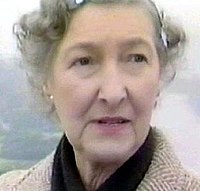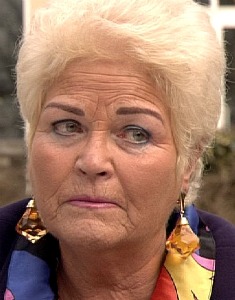
Pat Evans is a fictional character from the BBC soap opera EastEnders. She was played by Pam St Clement from 12 June 1986, just over a year after the show first aired, until her departure on 1 January 2012. Pat was also portrayed by Emma Cooke in a soap 'bubble', Pat and Mo: Ashes to Ashes, delving into her past with sister-in-law Mo Harris, which aired in 2004. The character was killed-off on 1 January 2012, shortly after being diagnosed with pancreatic cancer. Her funeral was on 13 January 2012. Pat was one of the longest serving characters on the show, appearing for 25 years and six months. She returned, along with other women from Ian Beale's past, in a concussion-related dream sequence for a Children in Need special on 14 November 2014. She also made a return as a hallucination for Peggy Mitchell's death on 17 May 2016.

Patricia Doreen Coombs was an English actress. She specialised in the portrayal of the eternal downtrodden female, comically under the thumb of stronger personalities. She was known for many roles on radio, film and television sitcoms and Children's ITV's Playbox and Ragdolly Anna. Her authorised biography, written by Andrew Ross, was published in 2021.

Pete Beale is a fictional character from the BBC soap opera EastEnders, played by Peter Dean. He makes his first appearance in the programme's first episode, on 19 February 1985. The character was introduced by Tony Holland, one of the creators of EastEnders; he was based on a member of Holland's family. Pete is featured in the soap for eight years as the local fruit and veg trader of Albert Square; he is a member of the original focal clan in the serial, the Beales and Fowlers. Pete is portrayed as a macho and somewhat insensitive individual who struggles to cope with emotion. Pete was axed from the soap in 1993 and departed in May that year after over eight years on-screen. The character was killed off-screen later that year, following Peter Dean's public criticism of the BBC.
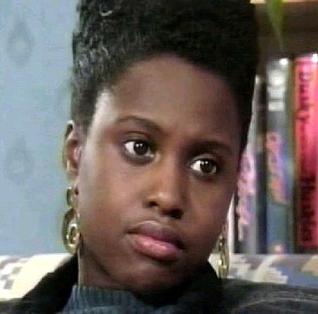
Hattie Tavernier is a fictional character from the BBC soap opera EastEnders, played by Michelle Gayle between 5 July 1990 and 21 December 1993. Hattie and her family were introduced in July 1990 by producer Michael Ferguson. The Taverniers were the first collective black family to join the soap at the same time. Portrayed as an intelligent, independent young woman, Hattie remained in the serial after the departures of many of her screen family, covering issues such as miscarriage and sexual harassment.

Diane Butcher is a fictional character from the BBC soap opera EastEnders, played by Sophie Lawrence. Diane appeared as a regular character between 1988 and 1991, when Lawrence decided to leave. The character made several brief returns in 1993, 1994, and 1997. In 2008, she returned for her father Frank Butcher's funeral, and on 20 June 2012 she returned for her sister Janine Butcher's wedding, departing on 29 June 2012.

Edna Lillian Doré was a British actress. She was known for her bit-part roles in sitcoms and for playing the character of Mo Butcher in EastEnders from 1988 to 1990.

Simon "Wicksy" Wicks is a fictional character from the British BBC soap opera EastEnders, played by Nick Berry between 1985 and 1990. Wicksy was introduced to take on some of the more adult storylines that had been scripted for another character, Mark Fowler; Mark's actor, David Scarboro, had left the serial prematurely due to personal problems. Wicksy was the soap's first male pin-up.

Clyde Tavernier is a fictional character from the BBC soap opera EastEnders, played by Steven Woodcock. Introduced on 5 July 1990, Clyde featured in prominent storylines including an inter-racial relationship with Michelle Fowler and being framed for the murder of publican Eddie Royle. The character was written out in 1993 and was given a happy ending, leaving on 22 July 1993.
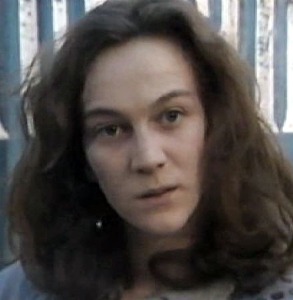
Donna Ludlow is a fictional character from the BBC soap opera EastEnders, played by Matilda Ziegler. She appears between episodes 265 and 437 of EastEnders, originally appearing on screen from 27 August 1987 to 13 April 1989. Donna was scripted as a troubled individual, desperate for attention, but shunned by almost all who encountered her. In her storyline, after finding out she was conceived from rape and then rejected by her mother, Donna sets herself on a path of self-destruction. She turns to manipulation, blackmail and prostitution to fund her drug-habit, before choking to death on her own vomit in 1989.

Mehmet Osman is a fictional character from the BBC soap opera EastEnders, played by Haluk Bilginer. Mehmet is portrayed as a charmer, rogue and a serial womaniser, and makes recurring appearances in EastEnders from 1985 to 1987, and then regularly until 1989.

Mo Butcher is a fictional character from the BBC soap opera EastEnders, played by Edna Doré between 1988 and 1990. She is introduced as the matriarch figure of the Butcher family, Frank Butcher's elderly mother. She is portrayed as a battle-axe, tough and interfering. Her most notable storyline first aired in 1990, when the character is used to portray descent into Alzheimer's disease. Doré opted to leave the serial that same year; Mo was written out of the soap making her last appearance in November. Mo was killed off in 1992, but her death was not screened.

Carmel Jackson is a fictional character from the BBC soap opera EastEnders, played by Judith Jacob from 5 June 1986 to 24 August 1989. Carmel, a health visitor, was initially introduced in a recurring, minor role in 1986, when she is credited as "health visitor". Producers saw potential in the character, and script writers were asked to develop more prominent storylines, and Carmel became a regular character. She is portrayed as a well-meaning, caring individual who is forever getting everyone's problems dumped on her. She is featured in storylines about domestic violence and various family and career upsets. Jacob remained in the role until 1989, when she opted to leave. Off-screen, the character was the subject of criticism regarding the portrayal of her profession from the Health Visitors Association.
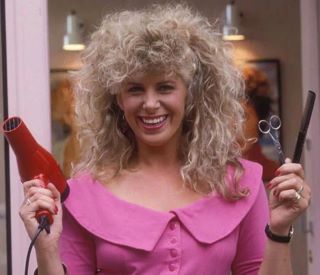
Julie Cooper is a fictional character from the BBC soap opera, EastEnders, played by Louise Plowright from 1989 to 1990. The character was one of Mike Gibbon's introductions, but she was axed in 1990 at the start of Michael Ferguson's reign as executive producer. Julie is portrayed as a bubbly, big haired Salford girl, who has a hungry appetite for men.

Trevor Andrew Short is a fictional character from the BBC soap opera, EastEnders, played by Phil McDermott from 1 June 1989 to 1 March 1990.

Paul Priestly is a fictional character from the BBC soap opera, EastEnders, played by Mark Thrippleton, from 20 April 1989 to 1 March 1990.

Laurie Bates is a fictional character from the BBC soap opera EastEnders played by Gary Powell. Laurie was introduced by producer Mike Gibbon in September 1989 as a rival to the long-established character Pete Beale – he opens up a business in direct competition to him and then dates his estranged wife Kathy. Laurie Bates was one of many characters to be axed early in 1990, following the introduction of the serial's new executive-producer, Michael Ferguson. He makes his last appearance in March 1990, lasting roughly six months on-screen.

Celestine and Etta Tavernier are fictional characters from the BBC soap opera EastEnders, played by Leroy Golding and Jacqui Gordon-Lawrence respectively. Both appear primarily in the serial as a married couple between 1990 and 1992. Celestine makes a further guest appearance in 1993, while Etta makes a guest appearance in 1994, both visiting remaining members of the Tavernier family. Celestine is portrayed as a strict disciplinarian and a devout Christian who expects everyone in his family to show similar dedication to the church and abide by his rules. His unwavering demand for respect often alienates his children and almost causes the breakdown of his marriage. Also religious, Etta is portrayed as a career woman; her most prominent storylines concern marital problems and crises of faith.
